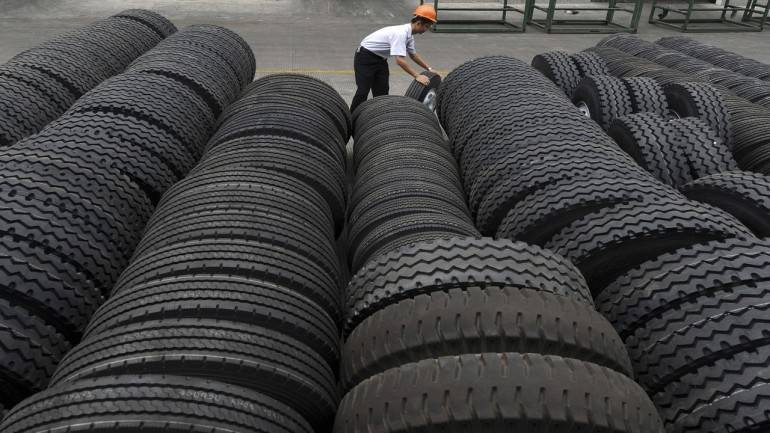While raw material volatility is something that the sector has to live with, the end market looks exciting and offers secular growth opportunity.
Tyre companies historically had the handicap of not being able to pass on the full rise in the raw material (RM) prices to the customers, leading to significant pressure on margin. They bore the brunt of the rising RM prices in the ugly set of first-quarter results. However, the decline in RM prices from then on has aided the results for the second-quarter ended September 2017. While raw material volatility is something that the sector has to live with, the end market looks exciting and offers secular growth opportunity. We try to find an answer to the key question as to which tyre stock to bet on to negotiate the bumpy terrain.
Raw material prices – a big worry is now easingPrices of natural rubber, a key raw material, had been rising until February 2017. From a low in October last year, prices rose nearly 25 percent until March before easing off. The effect of the increase was witnessed in the first quarter result of tyre companies.
Natural rubber prices have come off 16 percent from their highs in February till the end of September; it partly got offset by rising crude prices, another dominant component of raw material basket. On a net basis, RM cost increased by 12 percent (YoY) while it declined by 9 percent (QoQ) that aided the sequential improvement in margin and profitability.
However, companies are yet to reach the level of margins they achieved in 2QFY17. The management of most of the companies expects RM costs to be stable in 3QFY18 with a probability of firming up in 4QFY18.

As highlighted in our previous note, GST-led destocking impacted the performance of tyre companies in the 1QFY18 quarter. However, GST should help these companies as well since it would deter the Chinese imports. With the possibility of evading taxes dwindling, imported tyres will get costlier thereby reducing the price advantage of Chinese competition. This benefit was partially visible in the results for 2QFY18. We continue to expect demand to grow on the back of positive GST impact.
Anti-dumping duty – a big respite
The tyre industry had been demanding anti-dumping duty on cheap imports for a while. Post implementation of the anti-dumping duty in September, Chinese imports are down to 70k levels from the peak of 140-150k.
CEAT – good but expensiveCEAT has 12 percent revenue market share in India and is the fourth largest player. Over the years, it has become a strong domestic player on the back of its efforts to expand distribution network (4,500+ dealers) and increase brand building activities. CEAT’s strategy is focused on high-margin consumer-oriented segments such as passenger vehicle and two-wheelers. It is now also moving towards off-highway tyres, which is a very high-margin category.
From the 2Q result perspective, despite the decline in the topline, the company was able to post a significant EBITDA margin expansion of 810bps (QoQ) on the back of a fall in the RM basket prices, although EBITDA margin remains flat on YoY basis. The management indicated that export markets continue to face headwinds.

The company continues to invest in the capacity expansion: Nagpur plant commissioned 69 MT/day capacity as of September 2017 and Halol Phase II plant commissioned 76 MT/day as of September 2017.
MRF – deserves the premiumMRF is the leader in the Indian tyre market with close to 28 percent revenue market share. The company has built a huge brand and has a formidable distribution network which helps in catering to a large number of customers.
While topline grew marginally by 0.7 percent (QoQ), its EBITDA margin expanded by a whopping 920bps - highest expansion among all players, indicating that the leader can capitalise on the decline in RM prices better than others.

Apollo Tyres – Due for a re-rating
With the capex cycle coming to an end, the company is due for a re-rating. Apollo has invested heavily in the Hungary and Chennai TBR greenfield projects over FY16-18e and is now in the production ramp-up phase.
The company witnessed an increase of 5.9 percent (QoQ) in the top line on the back of increase in the volume across segments except for farm equipment. Apollo Tyres’ EBITDA margin also expanded by 220bps (QoQ) on the back of a fall in the RM prices.
The management indicated that the gradual ramp-up of new additional capacity, higher depreciation, and finance cost would be a drag on company’s performance in FY18. However, the management is confident that the earnings will pick up once the ramp-up period is over.

Valuations – Apollo at steep discount
MRF, the leader, deserves premium valuations on the back of its impeccable record and ability to weather headwinds. We would advise investors to accumulate the stock on any weakness.
For CEAT, despite our comfort with the business and strategy, the valuation leaves us cold.
Apollo Tyres is trading at a steep discount compared to MRF and CEAT. We advise long-term investors to gradually accumulate the stock in a soft year like FY18.

For more research articles, visit our Moneycontrol Research Page.
















